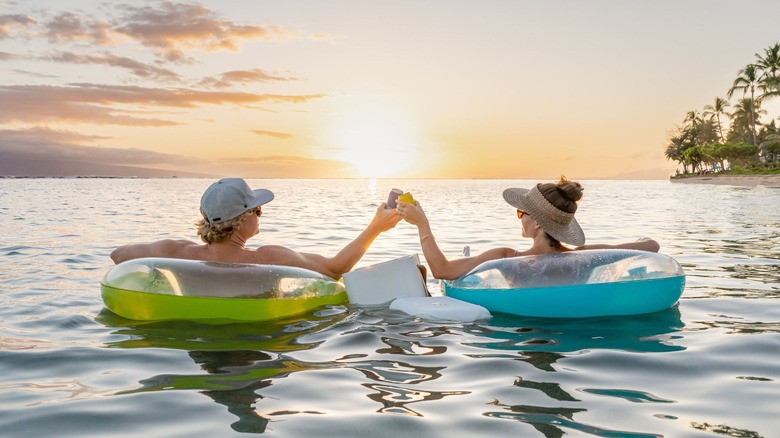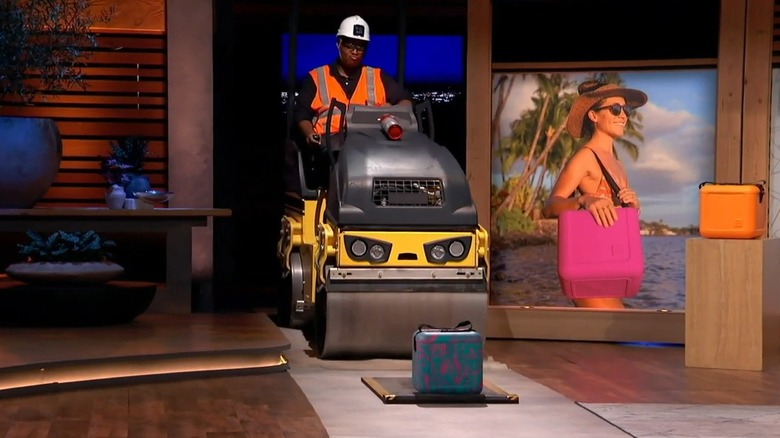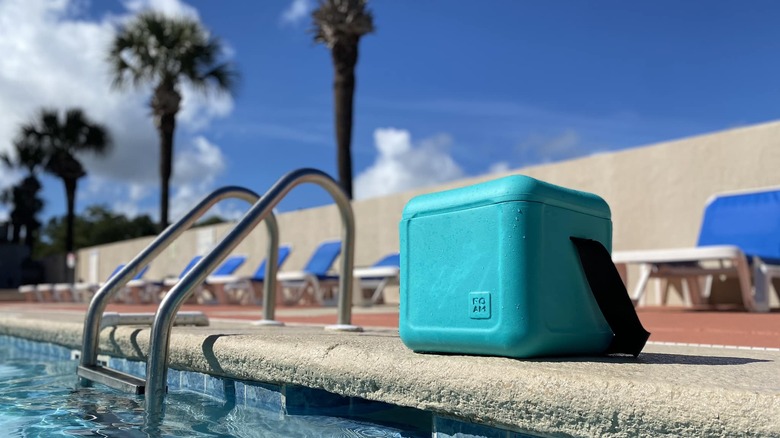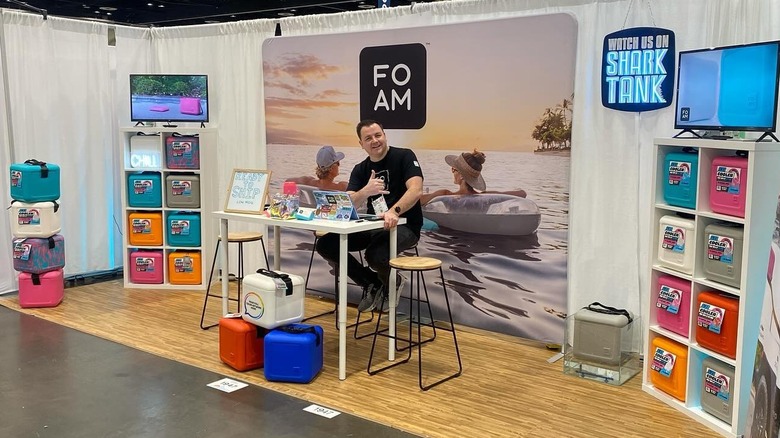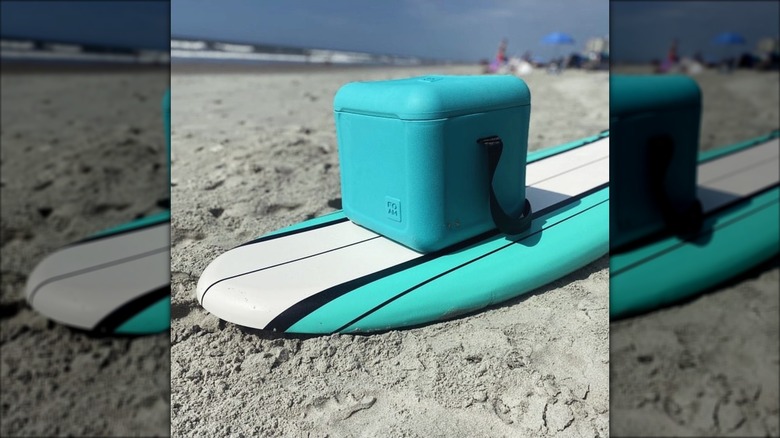FOAM Coolers: Here's What Happened After Shark Tank
We may receive a commission on purchases made from links.
"Shark Tank" has seen its fair share of innovative ice chests. The company Kanga was formed by a group of university students who wanted a better way to keep their beer cold. IcyBreeze was a product designed to keep its users cool as well as the food and drinks it contained. Modern Picnic offered stylish handbags with insulated interiors, letting professionals take their lunches to work with incognito style. For season 16, episode 6 of the show (which aired November 22, 2024), two veterans of the commercial cooler industry brought their invention, the FOAM Cooler, to the Tank in hopes of securing a cool cash infusion from one of the Sharks.
David Kittle and Chad Lee presented their colorful coolers, which they said are the first to be made using 100% EVA foam — the same material Crocs shoes are made from. The entrepreneurs explained they saw a gap in the marketplace, with many coolers being designed for hardcore outdoor activities. These vessels are heavy, expensive, animal-proof, and can keep ice frozen for days on end. But they wanted to offer a simple, functional, lightweight day cooler that the average person could use for less extreme activities, like going to the beach or the park.
They shared that EVA foam construction made their coolers extremely lightweight, sustainable, able to float on water, easy to clean, and resistant to damage. To demonstrate this, the pair had a steamroller brought into the room, which ran over one of their coolers. The cooler promptly popped back into shape, none the worse for wear — but the steamroller driver damaged part of the set as he exited, earning laughs and jokes from the panelists. But, though they laughed, did the Sharkstake a bite?
What happened to FOAM Coolers on Shark Tank?
The FOAM entrepreneurs were seeking $150,000 in exchange for a 10% stake in their company. Present were Sharks Daymond John, Kevin O'Leary, Lori Greiner, Mark Cuban, and guest panellist Todd Graves, founder of Raising Cane's restaurants.
David Kittle and Chad Lee shared that they had worked extensively with major cooler manufacturers and met while working for the Coleman company. Kittle is a product designer, and Lee specializes in sales and product development. Kittle shared that he performed product design work for several "Shark Tank" companies, including Tushbaby and Guardian Bikes. He saw his clients go on to make millions of dollars and realized he should be doing the same thing. The duo explained that FOAM had achieved $114,000 in year-to-date sales during 2024, with a commitment for another $137,000. They were also preparing to launch their products in 97 Target stores.
Cuban, Greiner, and Graves complimented the entrepreneurs and their product but didn't make any offers. O'Leary offered the asked-for $150,000 but for 33⅓% of the company, stating he wanted to be a third partner. Contingent on their coolers selling well in Target, he would approach the distributor that handles Bertello Pizza Ovens, one of his "Shark Tank" deals, to get FOAM Coolers into major retail stores.
John commented that the coolers had a high-end price but not a high-end appearance — shoppers wouldn't be able to discern between FOAM and ordinary Styrofoam coolers. He offered $150,000 for a 30% stake, suggesting they pursue licensing deals with other brands rather than focusing on retail sales.
The entrepreneurs attempted to negotiate lower percentages, but O'Leary and John stuck to their offered numbers. Ultimately, they took John's deal.
FOAM Coolers after Shark Tank
As frequently happens when a product appears on "Shark Tank," things exploded for FOAM Coolers once the episode aired. David Kittle and Chad Lee shared, via the "Everything Intellectual Property" podcast, that the FOAM website was only getting about 10 to 12 visitors per day at most prior to their "Shark Tank" appearance. The night their episode aired, however, the site received 27,000 visitors within about two hours.
The duo has been busy in the months since they forged their "Shark Tank" deal, riding the waves of their television exposure, filling orders, and doing the trade show circuit with their product. Lee shared, via the company's Facebook page, that he sold more than 100 FOAM Coolers in just one day at January's Surf Expo in Orlando, Florida. Calculated at the company's retail price for the products, that's more than $10,000 in sales from one booth in one day.
It hasn't all been smooth sailing, though. As many U.S. businesses experienced, FOAM was hit hard by import and export tariffs implemented by President Donald Trump's administration. Lee reported, via LinkedIn, that the company received a $55,000 tariff bill for just one container of its products in early 2025. In response, FOAM began frantically exploring options to move its manufacturing from China to the United States, including potentially developing its own factory. FOAM also raised the price of its coolers from $99 per unit to $125. FOAM's founders joined with some other entrepreneurs in lobbying U.S. lawmakers to institute grants that would help small businesses build domestic factories. Finding that manufacturing in the U.S. wasn't financially feasible, however, FOAM's founders elected to keep their product production in China for the time being.
Is FOAM Coolers still in business?
FOAM Coolers is definitely still in business, as of November 2025. Post-"Shark Tank," the company successfully launched its products in Target and REI stores, which were both in-progress deals the founders mentioned during their "Shark Tank" taping. The company's products are still being sold by those retailers, as of November 2025, and FOAM's merchandise is also being sold via QVC, Walmart, Wayfair, and Amazon. National media coverage continues for the products, too. In July 2025, for instance, FOAM Coolers was featured on ABC Network's "Live with Kelly and Mark" in a segment highlighting standout products.
In addition to its online sales avenues, FOAM has a presence in more than 160 brick-and-mortar retail stores, as of November 2025. The company has also ventured into the international market with product placement at stores in Puerto Rico and Panama.
The company seems to still be actively working with Daymond John. The Shark filmed a video in October 2025 on behalf of FOAM to help bolster a breast cancer awareness promotion the company was offering. The wife of company co-founder Chad Lee was diagnosed with breast cancer in 2024, and FOAM decided to donate a portion of its October 2025 sales proceeds in support of breast cancer research. John's video urged consumers to support FOAM and the cause by purchasing the company's coolers or by donating to the Breast Cancer Research Foundation directly.
What's next for FOAM Coolers?
For now, FOAM's leaders are focused on maintaining exceptional customer relations and fostering word-of-mouth advertising via those who own the product. The founders personally call customers who are having any issues, and they even write personal thank-you messages on their product packages before shipping them to buyers. The company has also ramped up its online content during 2025, including producing instructional and promotional videos, in an effort to stay in front of its audience.
Whether the pathway Daymond John presented to FOAM's founders on "Shark Tank" is being actively pursued — establishing product licensing agreements with other brands — is not readily apparent. The 4AllPromos company is offering customizable versions of the brand's coolers, including bulk purchase options, as of November 2025, so purchasers can, through that entity, add logos and wording to the products. FOAM itself also offers B2B options, letting companies order custom-branded coolers bearing their business logos or promotional messaging.
Regarding the tariff-related difficulties the company encountered, prompting FOAM to raise its prices, that seems to have been addressed to some extent. The cost of FOAM Coolers has returned to $99 on the brand's website, as of November 2025. The coolers are also listed for $99 on sites like Target.com and Amazon, though retailers like Walmart and Wayfair still list them at the increased price point of $125.
If FOAM does end up moving its manufacturing to the United States and establishing its own factory at some point, the founders have discussed producing large-format EVA foam products for other brands, in addition to manufacturing their own coolers. So, that may be a future endeavor the company will pursue down the road.

